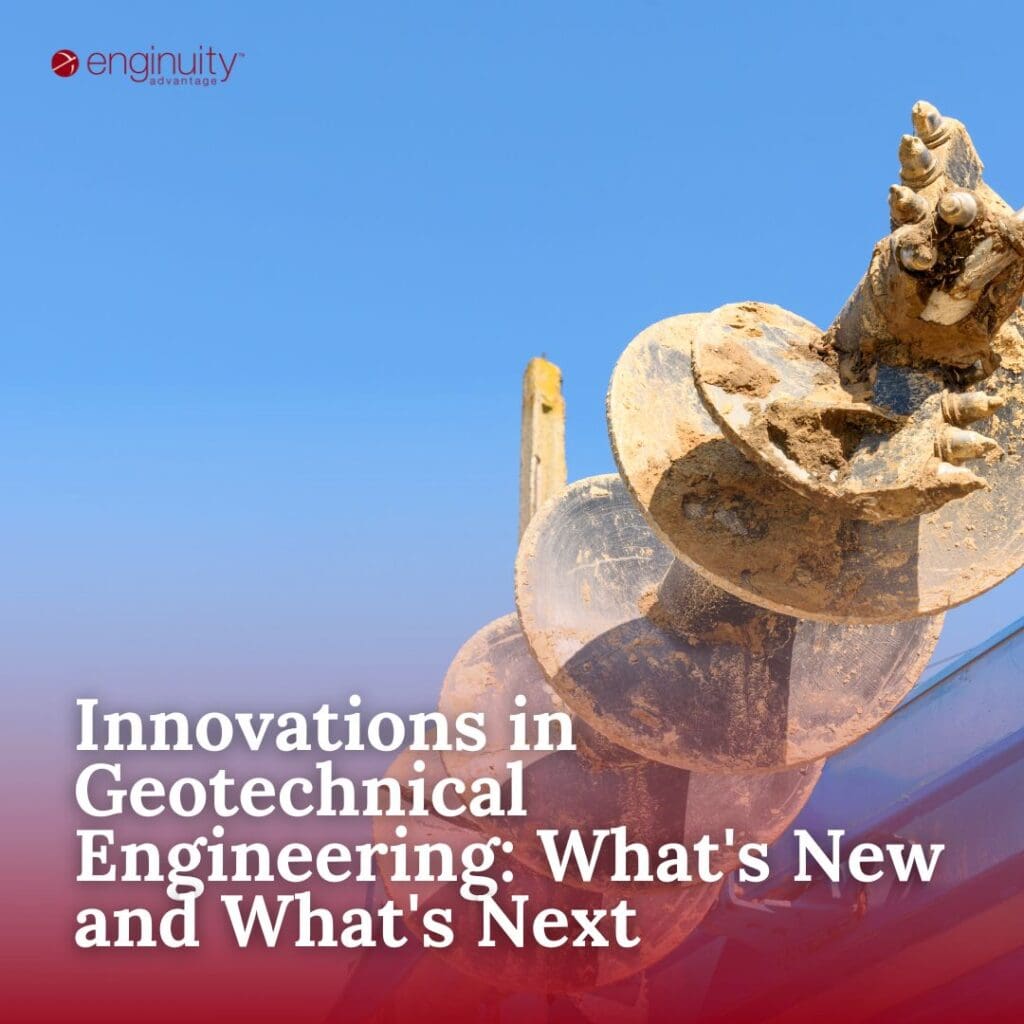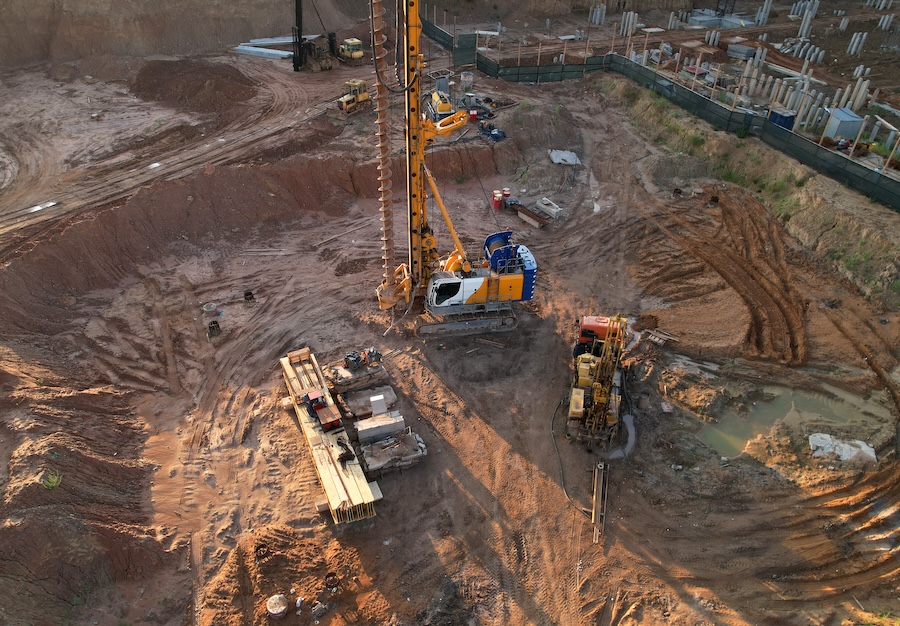Why All About Geotechnical Engineering Matters in Today's Facilities Advancement
Wiki Article
The Relevance of Geotechnical Design in Dealing With Ecological Obstacles and Enhancing Building Security
Geotechnical design acts as a foundation in the intersection of environmental stewardship and construction safety and security, offering vital understandings into the actions of soil and rock under numerous conditions. This self-control not only addresses pushing environmental challenges such as soil disintegration and groundwater defense yet also boosts the robustness of framework versus natural threats. By implementing strategic website investigations and tailored reduction procedures, geotechnical engineers play a vital duty in securing both human lives and environmental integrity. The intricacies of these difficulties raise crucial questions concerning the future direction of this area and its ramifications for lasting advancement.
Duty of Geotechnical Design
Geotechnical design plays an important function in the style and building of facilities by resolving the behavior of dirt and rock products under various problems. This field of engineering is crucial for comprehending the interaction between structures and the ground, that includes determining the load-bearing ability of dirt, examining stability, and predicting potential negotiation or failure.Geotechnical engineers are accountable for performing site investigations, which entail tasting and testing dirt and rock to gather data on their physical and chemical residential properties. This info is important for developing foundations, keeping wall surfaces, and various other earth-retaining structures that guarantee safety and longevity. Additionally, geotechnical design notifies the option of suitable construction techniques and materials, thereby minimizing risks related to soil habits.
Additionally, the combination of geotechnical design principles right into urban planning and ecological management is critical for attending to obstacles such as ground contamination and groundwater administration. By comprehending geotechnical aspects, engineers can create lasting services that boost the durability of infrastructure against all-natural threats, while also promoting ecological stewardship. Inevitably, the role of geotechnical engineering is essential for attaining secure, durable, and ecologically mindful building and construction techniques.
Dirt Erosion Reduction
Dirt disintegration poses a considerable danger to both ecological security and framework integrity, impacting roughly 24 billion bunches of abundant dirt shed annually worldwide. This phenomenon is intensified by elements such as deforestation, urbanization, and bad farming methods. Geotechnical design plays an essential duty in creating reliable dirt disintegration mitigation methods that secure both the atmosphere and building jobs.One method involves the application of erosion control methods such as vegetation growing, which maintains dirt with root systems. Additionally, the construction of retaining balconies and walls can successfully minimize surface runoff and protect vulnerable locations from disintegration. Appropriate drainage layout is additionally vital; it lessens water build-up and directs excess drainage far from vital structures.
Moreover, geotechnical designers utilize soil stablizing methods, such as the application of geotextiles and biodegradable mats, to enhance soil cohesion and protect against destruction - about geotechnical engineering. Routine tracking and assessment of erosion-prone sites make it possible for timely interventions, making certain long-lasting sustainability. By incorporating these strategies, geotechnical design not only alleviates the impacts of dirt erosion however also adds to the resilience of facilities against environmental difficulties, ultimately fostering a safer and extra lasting developed environment
Groundwater Security Approaches
Groundwater acts as an essential resource for alcohol consumption water, agriculture, and commercial processes, making its security essential for ecological sustainability and public wellness. Effective groundwater security strategies are vital in minimizing contamination risks and making sure the long life of this resource.
Routine monitoring of groundwater top quality is likewise important, making it possible for early discovery of contamination sources and facilitating prompt remediation check this initiatives. Employing innovative technologies, such as geophysical studies and remote sensing, help in identifying possible risks to groundwater gets.
Additionally, public education and learning and stakeholder engagement are crucial, promoting area support for groundwater security initiatives. geotechnical engineer description. By integrating governing measures, technical innovations, and community participation, we can develop an extensive structure that safeguards groundwater sources while promoting sustainable growth and construction practices
Landslide Danger Monitoring
Landslides pose considerable hazards to both human safety and security and infrastructure, making efficient threat monitoring strategies crucial. Geotechnical engineering plays an essential role in recognizing, evaluating, and mitigating landslide dangers. A thorough understanding of incline security, soil mechanics, and hydrology is important for establishing efficient danger monitoring strategies.The primary step in landslide threat management involves detailed site investigations, that include geological mapping and soil testing. These investigations assist engineers assess the capacity for landslides by determining vital aspects such as incline angles, soil composition, and water content. Utilizing advanced technologies such as remote sensing and geophysical studies can boost the precision of these evaluations.
When risks are identified, appropriate reduction actions can be applied. These might include engineering remedies such as preserving wall surfaces, drain systems, and slope stablizing methods. Keeping an eye on systems ought to be established to identify indications of ground movement and adjustments in water levels, permitting for positive interventions.

Enhancing Building And Construction Safety And Security
Construction sites often present a myriad of risks that can jeopardize worker safety and project integrity. Geotechnical engineering plays a critical role in enhancing building and construction safety and security by giving crucial insights right into subsurface conditions. Via go to my blog extensive dirt and rock analysis, geotechnical designers can identify potential dangers, such as dirt instability, groundwater concerns, and seismic susceptabilities, which might endanger the safety of building and construction tasks.Applying geotechnical services, such as correct foundation layout and the use of preserving structures, alleviates these risks dramatically. These solutions not just ensure the security of the frameworks being built yet also develop a much safer working setting for construction workers.
Additionally, cultivating a society of safety through training and adherence to established security procedures better boosts construction site safety. By integrating geotechnical know-how right into the preparation and implementation stages, building and construction tasks can attain greater safety and security criteria, inevitably protecting employees and making certain effective project conclusion.
Verdict
To conclude, geotechnical design works as a critical technique in dealing with environmental difficulties and advertising building safety and security. Through efficient soil erosion reduction, groundwater protection strategies, and landslide risk monitoring, geotechnical designers contribute to the growth of durable framework. The assimilation of these practices promotes a much safer construction atmosphere and boosts the sustainability of civil engineering tasks. Ultimately, the proficiency of geotechnical designers is crucial in protecting both natural deposits and human lives against potential hazards.Geotechnical design serves as a keystone in the intersection of ecological stewardship and construction security, providing important insights into the actions of soil and rock under various conditions. Geotechnical design informs the choice of ideal construction approaches and products, thus decreasing risks connected with dirt actions.
Geotechnical engineering plays an essential duty in developing efficient dirt disintegration reduction strategies that secure both the setting and building and construction projects.
Additionally, geotechnical designers use dirt stabilization techniques, such as the application of geotextiles and naturally degradable floor coverings, to boost dirt cohesion and prevent deterioration. With detailed dirt and rock evaluation, geotechnical designers can identify potential risks, such as soil instability, groundwater issues, and seismic vulnerabilities, which may jeopardize the security my latest blog post of building tasks.
Report this wiki page